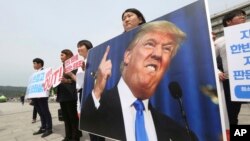When North Korea slammed U.S. Vice President Mike Pence and national security adviser John Bolton, its language was very blunt and impolite. But it was milder than its typical crude and inflammatory insults unleashed on other top U.S. and South Korean officials.
The North likely had just tried to strengthen its position in negotiations on the amount of concessions it could wrest from the United States in return for giving up its nuclear program.
But its calling Pence a "political dummy" was still strong enough for President Donald Trump to cite North Korea's hostility in scrapping his planned June 12 summit with North Korean leader Kim Jong Un, at a time when the president faced mounting pessimism at home about Kim's commitment to disarming.
Apparently startled at Trump's abrupt move, a senior North Korean official who touched off his country's recent rhetorical attacks on Washington issued an unusually conciliatory statement Friday saying the North still wants to engage with the United States.
A look at how North Korea's statements have evolved over the past nine days, from harsh criticism of U.S. officials and threats to cancel the summit to a near apology:
Bolton criticism
After canceling a high-level dialogue with South Korea, North Korean Vice Foreign Minister Kim Kye Gwan on May 16 issued a statement threatening to do the same with the Kim-Trump talks if the United States continues to "drive us into a corner to force our unilateral nuclear abandonment."
Kim Kye Gwan categorically took issue with the remarks by Bolton that North Korea should follow the "Libyan model," which many experts say meant the North must take complete nuclear disarmament steps before getting major sanctions relief or other outside benefits.
"We shed light on the quality of Bolton already in the past, and we do not hide our feeling of repugnance toward him," Kim Kye Gwan was quoted as saying in the statement carried by the Korean Central News Agency.
Kim Kye Gwan's wording was weaker than a previous salvo North Korea fired off about the hawkish U.S. official.
In 2003, North Korea's state media called Bolton "human scum" after he described then-North Korean leader Kim Jong Il, the late father of Kim Jong Un, as a "tyrannical dictator." In 2007, when Bolton raised strong skepticism about North Korea's previous disarmament pledges, state media said he "talked trash" and that he is "ill-famed for speaking ill of the countries standing for progress and peace."
Pence criticism
This directly prompted Trump to say that it is "inappropriate" to go ahead with the summit because of the "tremendous anger and open hostility" displayed in the North's "most recent statement."
In remarks carried by state media on Thursday, Choe Son Hui, another North Korean vice foreign minister, called Pence a "political dummy" over his comments during a Fox News interview that again compared North Korea with Libya.
"As a person involved in the U.S. affairs, I cannot suppress my surprise at such ignorant and stupid remarks gushing out from the mouth of the U.S. vice president," Choe said. "In case the U.S. offends against our goodwill and clings to unlawful and outrageous acts, I will put forward a suggestion to our supreme leadership for reconsidering the [North]-U.S. summit."
Choe's "political dummy" comment was certain to anger the United States. But again, in the past, North Korea attacked others including Trump using worse language.
At the height of nuclear tensions between the countries last year, Kim Jong Un personally called Trump "the mentally deranged U.S. dotard" after Trump portrayed him as "the Rocket Man" on a "suicide mission." His propaganda machine called Trump a "war maniac" and "mad man."
North Korea's state media called former President Barack Obama a "monkey," and his secretary of state, John Kerry, a wolf with a "hideous lantern jaw." They called South Korea's former conservative presidents Park Geun-hye a "prostitute" and Lee Myung-bak a "rat."
Letter of apology
About eight hours after Trump publicly called off the summit, Kim Kye Gwan issued a lengthy statement saying North Korea is still willing to sit down with the United States "at any time, in any format."
"The first meeting would not solve all, but solving even one at a time in a phased way would make the relations get better rather than making them get worse. The U.S. should ponder over it," Kim Kye Gwan said.
Kim Kye Gwan called Trump's decision "very regrettable" but his statement still apparently focused on stressing that Trump misunderstood the North's true intentions. Experts say it was obvious the North had no plans to walk away from the U.S. summit from the beginning.
It was also highly unusual for the North to make such a quick response to any major policy announcements by Washington and Seoul, and especially one that is so conciliatory in tone.
"What appears to be close to an apology letter was contained in Kim Kye Gwan's statement," said Koh Yu-hwan, a professor at Seoul's Dongguk University.
Choi Kang, vice president of Seoul's Asan Institute for Policy Studies. said he believes Trump used the Pence criticism as a way to pull out of the summit because his government wasn't sure if North Korea would disarm in a manner that he wants.




